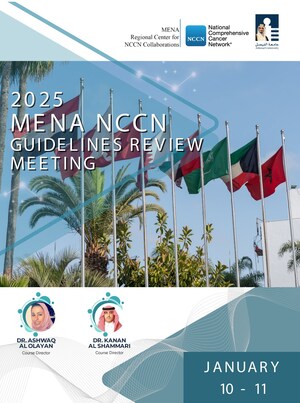National Comprehensive Cancer Network Oncology Research Program Supports Clinical Trial for Lung Cancer
Phase II randomized trial led by investigators at Fox Chase Cancer Center will look at chemotherapy combinations for people with stage IV non-squamous non-small cell lung cancer with EGFR mutation or who never smoked
PLYMOUTH MEETING, Pa., Oct. 28, 2019 /PRNewswire/ -- The National Comprehensive Cancer Network (NCCN®) Oncology Research Program (ORP) today announced plans to support a phase II randomized trial for lung cancer patients. The study is titled TH-138: Phase II randomized trial of carboplatin + pemetrexed + bevacizumab, with or without atezolizumab in stage IV non-squamous NSCLC patients who harbor a sensitizing EGFR mutation or have never smoked. Joseph Treat, MD, Professor, Department of Hematology/Oncology, Fox Chase Cancer Center, will serve as principal investigator, with Hossein Borghaei, DO, and J. Nicholas Bodor, MD, PhD, also from Fox Chase Cancer Center, as co-investigators, along with Jyoti Patel, MD, incoming Assistant Director for Clinical Research at the Robert H. Lurie Comprehensive Cancer Center of Northwestern University. The study is made possible through collaboration with Genentech, who provided funding and study drugs.
"Lung cancer is the leading cause of cancer-related death in the United States and worldwide," said Wui-Jin Koh, MD, Chief Medical Officer, NCCN. "As advances are made in the development of targeted therapies and immunotherapies, there is opportunity for greatly needed improvement in outcomes."
Cigarette smoking remains the primary cause of most lung cancer cases, but nearly 20 percent occur in people who have never smoked1. Those non-smoking related cancers generally have a different molecular profile than those in smokers, including mutations in the epidermal growth factor receptor (EGFR), and may have variable response to checkpoint inhibitors.2
This study will focus on patients whose tumors include an EGFR mutation or who are never smokers (defined as fewer than 100 cigarettes in their lifetime). It will examine whether the anti-PD-L1 inhibitor atezolizumab plus carboplatin, pemetrexed, and bevacizumab will improve progression-free survival and overall survival in this population, as compared to carboplatin, pemetrexed, and bevacizumab.
The study is projected to take 31 months, and include more than 100 patients from across 15-20 cancer centers. It is open to people 18 and older who have not been previously treated with any systemic therapy other than tyrosine kinase inhibitors (TKIs).
The NCCN ORP fosters innovation and knowledge discovery that improve the lives of patients with cancer. Visit NCCN.org/ORP to learn more about past and current clinical investigations.
About the National Comprehensive Cancer Network
The National Comprehensive Cancer Network® (NCCN®) is a not-for-profit alliance of 28 leading cancer centers devoted to patient care, research, and education. NCCN is dedicated to improving and facilitating quality, effective, efficient, and accessible cancer care so patients can live better lives. Through the leadership and expertise of clinical professionals at NCCN Member Institutions, NCCN develops resources that present valuable information to the numerous stakeholders in the health care delivery system. By defining and advancing high-quality cancer care, NCCN promotes the importance of continuous quality improvement and recognizes the significance of creating clinical practice guidelines appropriate for use by patients, clinicians, and other health care decision-makers around the world.
The NCCN Member Institutions are: Abramson Cancer Center at the University of Pennsylvania, Philadelphia, PA; Fred & Pamela Buffett Cancer Center, Omaha, NE; Case Comprehensive Cancer Center/University Hospitals Seidman Cancer Center and Cleveland Clinic Taussig Cancer Institute, Cleveland, OH; City of Hope National Medical Center, Duarte, CA; Dana-Farber/Brigham and Women's Cancer Center | Massachusetts General Hospital Cancer Center, Boston, MA; Duke Cancer Institute, Durham, NC; Fox Chase Cancer Center, Philadelphia, PA; Huntsman Cancer Institute at the University of Utah, Salt Lake City, UT; Fred Hutchinson Cancer Research Center/Seattle Cancer Care Alliance, Seattle, WA; The Sidney Kimmel Comprehensive Cancer Center at Johns Hopkins, Baltimore, MD; Robert H. Lurie Comprehensive Cancer Center of Northwestern University, Chicago, IL; Mayo Clinic Cancer Center, Phoenix/Scottsdale, AZ, Jacksonville, FL, and Rochester, MN; Memorial Sloan Kettering Cancer Center, New York, NY; Moffitt Cancer Center, Tampa, FL; The Ohio State University Comprehensive Cancer Center - James Cancer Hospital and Solove Research Institute, Columbus, OH; O'Neal Comprehensive Cancer Center at UAB, Birmingham, AL; Roswell Park Comprehensive Cancer Center, Buffalo, NY; Siteman Cancer Center at Barnes-Jewish Hospital and Washington University School of Medicine, St. Louis, MO; St. Jude Children's Research Hospital/The University of Tennessee Health Science Center, Memphis, TN; Stanford Cancer Institute, Stanford, CA; UC San Diego Moores Cancer Center, La Jolla, CA; UCSF Helen Diller Family Comprehensive Cancer Center, San Francisco, CA; University of Colorado Cancer Center, Aurora, CO; University of Michigan Rogel Cancer Center, Ann Arbor, MI; The University of Texas MD Anderson Cancer Center, Houston, TX; University of Wisconsin Carbone Cancer Center, Madison, WI; Vanderbilt-Ingram Cancer Center, Nashville, TN; and Yale Cancer Center/Smilow Cancer Hospital, New Haven, CT.
Clinicians, visit NCCN.org. Patients and caregivers, visit NCCN.org/patients. Media, visit NCCN.org/news. Follow NCCN on Twitter @NCCN, Facebook @NCCNorg, and Instagram @NCCNorg.
1 Subramanian J, Govindan R. Lung cancer in never smokers: a review. J Clin Oncol 2007;25:561-570. Available at: https://www.ncbi.nlm.nih.gov/pubmed/17290066.
2 Based on the results of IMpower150, a large global Phase 3 study demonstrated that the combination of carboplatin, paclitaxel, bevacizumab and atezolizumab demonstrated clinically meaningful improvements in OS and PFS in patients with EGFR mutations who have failed TKIs, further hypotheses are being evaluated in TH-138. For more information see Socinski M, et al., Atezolizumab for First-Line Treatment of Metastatic Nonsquamous NSCLC. N Engl J Med 2018; 378:2288-2301. Available at: https://www.nejm.org/doi/full/10.1056/NEJMoa1716948.
Media Contact:
Rachel Darwin
267-622-6624
[email protected]
SOURCE National Comprehensive Cancer Network

Related Links
WANT YOUR COMPANY'S NEWS FEATURED ON PRNEWSWIRE.COM?
Newsrooms &
Influencers
Digital Media
Outlets
Journalists
Opted In





Share this article